Suffragettes 100 years on: Meet the women fighting for females in 2018
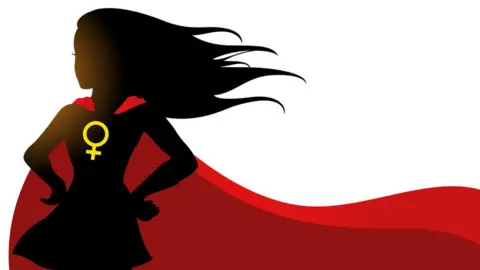 Getty Images
Getty ImagesOne hundred years since women were first granted the right to vote, the battle for equality rages on.
The Representation of the People Act in 1918 added 8.5 million women to the electoral roll.
Since then two female prime ministers have governed from Number 10 and there are 208 women in parliament.
But there are still many parts of life where young women continue to fight for female empowerment.
Martha, 24, fighting harassment
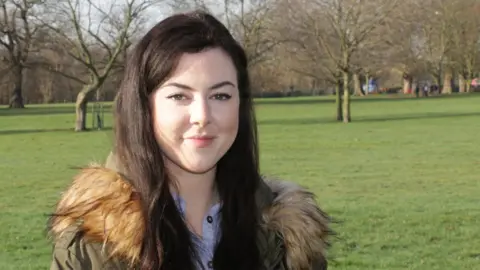
Martha led an anti-street harassment campaign while at university in Nottingham.
It led to misogyny being made a hate crime in the city.
"Women now feel safer on the streets of Nottingham. They can walk with their head held high.
"It doesn't mean these things aren't going to happen anymore, but if they do the police are going to act and take it seriously."
Officers in the city now define misogynistic hate crime as "behaviour targeted towards a woman by men simply because they are a woman".
That includes things like wolf-whistling and cat-calling.
"I think it's very easy to say this is the end of flirting, but I don't think that's true," says Martha.
"I think if you're flirting in a way which you feel might be touchy ground, then you're flirting in the wrong way."
Martha ran around 40 training sessions for police on misogynistic harassment and now wants the rest of the UK to follow suit.
Rania Ibrahim, 21, fighting FGM
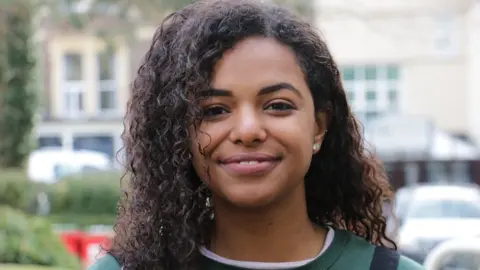
Bristol medical student Rania is working to end female genital mutilation (FGM).
The practice involves intentionally altering or injuring women's genitalia for non-medical reasons.
And despite carrying a prison sentence of up to 14 years in the UK, each year NHS England records thousands of new cases.
"It happens here. They do it in secret. Bristol has a big Somali community and it's very prevalent here," says Rania.
"I think it's a power play. It's seeing women as inferior, as weak, as needing to be controlled."
UNICEF estimate at least 200 million girls and women have been cut in 30 countries around the world.
"A lot of people think it's for religious reasons, but it's not allowed in Islam.
"To put it bluntly, it's men trying to control women's sexuality."
As part of her work with the youth led charity Integrate UK, Rania helped compose a song to play during outreach workshops in Bristol.
"We need to take away the taboo to get people to talk about it more," she adds.
Nasra Ayub, 21, fighting radicalisation
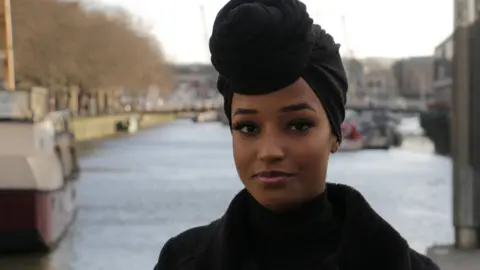
Approximately 850 people from the UK have travelled to support or fight for jihadist groups in Syria and Iraq, according to British authorities.
That figure includes a number of young women who have been radicalised online.
"When it comes to young girls who are being radicalised, a lot of the talk is about them being perpetrators, rather than victims," says Nasra.
"My work is to show the parallels between child exploitation and radicalisation, because it's the same kind of grooming process."
In 2015, three school girls from east London fled to Syria, after telling their parents they were going out for the day.
"It's all about power and control," Nasra says.
"It's very easy for men to assert themselves over women in certain communities.
"A lot of extremists groups target women because they think they are inferior."
The government provides guidance for schools and childcare providers on preventing children and young people from being drawn into terrorism.
But Nasra wants the prime minister to go further.
"I would ask Theresa May to fund grassroots organisations that are educating young people.
"I've seen this a lot through teaching in classrooms. You can change people's opinions of themselves in less than hour, so imagine what we could do if we could do that on a larger scale."
Tamsin Fagan, 21, fighting modern slavery
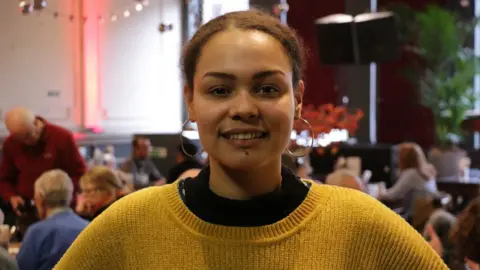
Modern slavery and human trafficking in the UK is "far more prevalent than previously thought", according to the National Crime Agency.
Tamsin works with victims in Liverpool.
"All of my clients are female and I'm still shocked by the amount of cases that I have, " she says.
"A lot of the women we work with are from societies where it's normal and expected to force people to be your maid, your nanny, or into sexual exploitation."
The International Labour Organisation say women and girls account for 99% of victims in the commercial sex industry.
"Sexual exploitation is definitely a women's issue," agrees Tamsin.
"It's more difficult when the woman thinks she's in love. They put all their trust in these people.
"The most you can do is ensure they have everything around them to know where to go where they can be safe."
But even when they have been found safe places to stay Tamsin says they're sometimes not fit for habitation.
"Some of it is not clean. I've had women with children asking time to help them with a rat problems.
"That's something I'd like to see change."
